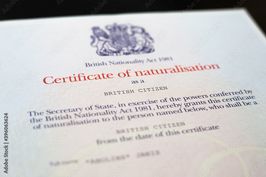
Citizenship. Simplified.

We can help you apply for British citizenship. Here we tell you how
-
What are the eligibility requirements to apply for British citizenship by naturalisation?
Settled/ILR status
The majority of applications for British citizenship (referred to as “naturalisation” applications) are made by individuals who have established their lives in the UK, and have held either Indefinite Leave to Remain or Settled Status for a 12 month period.
Indefinite Leave to Remain (ILR) is a type of immigration status given to individuals by the Home Office meaning that – broadly – they can stay in the UK indefinitely. It is also referred to as “Settled Status”.
The most common exception to the requirement to have held ILR/Settled Status for 12 months is if you are married to a British national at the time of making the application. If you are, you don’t need to wait for 12 months after obtaining ILR/settled status before applying.
Residency
Individuals who are not married to British citizens must have lived in the UK for at least 5 years without exceeding the maximum number of permitted absences.
Note that there is a reduced residency period of 3 years if you are married to a British citizen at the point of application.
See the FAQs (below) for the types of evidence the Home Office would expect individuals to provide with their applications to confirm a period of residency.
Good character
You must be of “good character” to successfully apply to naturalise as a British citizen.
This a broad requirement, and it is possible for individuals to fall foul of it even where they don’t have a criminal record or other formal interaction with the UK (or another country’s) civil or criminal justice system.
See the FAQs below for further details on how you can check whether you meet this requirement.
Knowledge of Life in the UK
You need to pass a test which confirms your knowledge of “life in the UK”. There are books and other resources you can get to help you prepare.
English language requirement
You need to demonstrate that you can speak English to a particular level.
There are exemptions available. Broadly, these apply to individuals from particular countries, those who have been educated to a certain level in English (and have provided specified evidence) and those who have previously passed a qualifying test in a previous visa application.
Otherwise you will need to take a test.
Age requirement
Individuals applying for naturalisation must be over 18 years of age.
There are other options available for children based in the UK to become British citizens, and the correct application will depend on a number of factors, including for example, the the child's place of birth or the immigration status of the parents etc.
These applications are generally referred to as “registration” applications.
Referees
All applicants for British citizenship must provide the details of two referees to establish their identity.
One referee should be a person of any nationality who has professional standing (see list below). The other referee must normally be the holder of a British citizen passport and either a professional person or over the age of 25.
The requirements are set out in our detailed explainer here. See our FAQs (below) if you are struggling to find a referee for your application.
-
How do I apply for British citizenship?
To apply for British citizenship, you must complete an online form and pay the application fee.
After this, applicants must upload supporting documents via a separate portal (details of how to access this portal are provided after you submit the application).
Finally, in order for the application to be considered by the Home Office, applicants will usually be required to attend a biometrics appointment. The appointment is booked via the same portal where your documents are uploaded.
We have created a walk-through-talk-through video of how to complete the online form, below.
-
How much does it cost to apply for British citizenship?
An application for British citizenship by naturalisation is £1,330.
You may also have to pay to book your biometrics appointment. These can cost up to £275 per applicant for prime slots, although cheaper (and, occasionally, free) appointments are sometimes available.
In a naturalisation application (based on residence in the UK), there is currently no process to request a waiver of the fees.
-
What information do I need to provide in the online application form?
The online form is where you enter all of the information required for a decision-maker at the Home Office to make a decision in your application.
The exact information you will need to provide depends on your circumstances, and will relate to how you meet the eligibility criteria (above).
We have prepared a walk-through-talk-through of the online form if you want a preview of the kinds of questions you will be asked, and which is available in the video below.
-
What supporting documents do I need to provide?
Exactly which documents you need to submit will vary depending on the individual circumstances of your case.
We have put together a walk-through-talk-through video which covers the evidence the Home Office would normally expect to see, and how we would normally present this in digital format as a part of the application. You can find this below.
-
Can you review my application before it is submitted?
British citizenship law can be extremely complex in some cases. Working out whether you are eligible for citizenship is usually the hard part, although gathering evidence to support applications (in complex cases) can also be a challenge.
We recommend our one-off consultation service to resolve any questions regarding eligibility. Please complete a contact form if you are interested in this service.
If you are sure that you meet the requirements and are comfortable completing online forms and uploading documents, then a lawyer is only really necessary where you are looking for additional assurance, to reduce stress, and/or to save time.
See our information on "How to choose your immigration lawyer" for further information

Completing the British Citizenship online application form?
Those applying to naturalise as a British citizen need to complete an online form. In the following video we go through an application form to give you an idea of what questions you will need to answer, and the information you will need to provide.
Please note that the information provided in this video is not legal advice, and is intended to give those applying for citizenship some insight into the process in a general way. If you would like us to review your application and consider your particular circumstances then please book a consultation.

Providing your British Citizenship application supporting documents
Once you have submitted your online application form, and before you attend your biometric enrolment appointment, you will need to upload your supporting documents. In this video we look at what evidence can be provided in support of a naturalisation application.
Please note that the information provided in this video is not legal advice, and is intended to give those applying for citizenship some insight into the process in a general way. If you would like us to review your application and consider your particular circumstances then please book a consultation.

How Can We Help With Your British Citizenship Application?
As a part of our one-off consultation service, we regularly review British citizenship application forms and supporting documents prior to their submission to the Home Office. This service is aimed at applicants who are
- concerned about their eligibility to apply for citizenship
- unsure about the exact type of supporting documents required in their application, or
- seeking reassurance/a second pair of eyes to make sure everything has been correctly completed
Your review will be undertaken by Nick Nason, principal at Edgewater Legal, and listed as an expert on the Lexis Nexis immigration experts Q&A panel, and regular commentator and contributor to Free Movement, the best read UK immigration law blog.
We charge a flat fee of £325 + VAT (£390 including VAT) for this service. You can find further details on our one-off consultation page.
As a part of the consultation, we are happy to offer our template covering letter, and which can be requested in advance of the session if you would like to work on this and have us review/develop during the consultation itself.
We regularly represent individuals making applications for British citizenship to the Home Office. If you instruct us to assist with your application, we will essentially manage the process from end to end. This includes the following
- Clear initial advice regarding eligibility with a detailed letter of advice and guidance on the route, and what is required
- Very high level of client responsiveness including contact by email, phone or other means
- Detailed scrutiny of online application and supporting documents prior to submission with collation and preparation of the application on a shared drive
- Drafting of a covering letter to be filed with application (if required)
- Uploading documents on the Home Office portal
- Advice and guidance on rights and responsibilities once citizenship obtained
- Your application will be dealt with exclusively by Nick Nason, principal at Edgewater Legal, and a senior practitioner
We offer our citizenship service for a fixed fee of £2,950 + VAT in straightforward cases.
In non-straightforward cases where the extent of the work required is not clear, or where there is a complexity and/or the matter is urgent, we would usually provide a time estimate of 8-15 hours for work in the application phase at our hourly rate of £325 + VAT.
Please note that our fee does not include the Home Office application or other fees.

Frequently Asked Questions
-
What are the most common mistakes that you see from applicants?
We review a lot of naturalisation applications here at Edgewater Legal. The following errors are ones we see time and again:
- Insufficient evidence of residence
- Poor document presentation
- Misunderstanding the referee requirements
- Non-disclosure of minor character issues
These errors - and ways to try and avoid them - are fleshed out in more detail here.
-
I don’t have a suitable referee. Will this be an issue in my application?
Yes. You will need to provide the details of two referees in your online application form. Those details include the following
- Full name
- Address(es) for last 3 years
- Date of birth
- Profession
- Phone number
- Email address
- British passport number (if British)
- How they know you
- They need to have known you for
Further details about the referee requirement are set out here.
-
I have a “good character” issue. Will my application be refused?
Anyone applying for citizenship with a “good character” issue should read the Home Office Nationality: good character requirement guidance.
If you are still unsure on whether or not you should proceed with your application, then we would recommend that you book a one-off consultation for advice on whether it will impact your eligibility.
-
Why are British citizenship applications refused?
According to Home Office data, the most common reasons for refusal of citizenship applications are
- Not being of good character
- Not being eligible
- Failing to meet the residence requirement
- Failing to respond to the Home Office (e.g. where they ask for further information or documents)
- Insufficient knowledge of English and/or Life in the UK
See our blog post The 6 most common reasons for refusal in citizenship applications for a detailed look at this.
-
How long does it take to get a decision in a British citizenship application?
The Home Office service standard (the time which it says is its target to decide applications) is 6 months.
-
I exceed the maximum absences from the UK in order to apply for citizenship. Should I still apply?
In order to meet the residency requirements, individuals applying for citizenship must not have been absent for more than 450 days during their 5 year qualifying period (or 270 if applying as the spouse of a British citizen under s6(2), and the qualifying period is 3 years). In addition, they must have not been absent for more than 90 days in the 12 months leading up to the submission of the application.
However, there is some flexibility in the absences requirement, as set out in the guidance (current at 10 November 2021), and discretion can be exercised to waive excess absences in certain circumstances. Those circumstances are as follows:
-
Where the applicant has absences of between 480-900 for applications under section 6(1) of the British Nationality Act 1981, or 300-540 for applications under section 6(2) and otherwise meets the requirements you must only consider exercising discretion where the applicant has established their home, employment, family and finances in the UK, and one or more of the following applies:
-
at least 2 years residence (for applications under section 6(1)), or 1 year (for applications under section 6(2)), without substantial absences immediately prior to the beginning of the qualifying period. If the period of absence is greater than 730 days (for section 6(1)) or 450 days (for section 6(2)) the period of residence must be at least 3 or 2 years respectively
-
the excess absences are the result of:
- postings abroad in Crown service under the UK government or in service designated under section 2(3) of the British Nationality act 1981.
- accompanying a British citizen spouse or civil partner on an appointment overseas
-
the excess absences were an unavoidable consequence of the nature of the applicant’s career, such as a merchant seaman or employment with a multinational company based in the UK with frequent travel abroad
-
exceptionally compelling reasons of an occupational or compassionate nature to justify naturalisation now, such as a firm job offer where British citizenship is a statutory or mandatory requirement
-
the excess absences were because the applicant was unable to return to the UK because of the global pandemic
-
There are similar provisions for excess absences in the 12 month period prior to making the application.
You would need to explain in your application why discretion should be exercised in your particular case, and provide evidence of this with your supporting documentation.
If you are still unsure on whether or not you should proceed with your application, then we would recommend that you book a one-off consultation for advice on this issue.
-
-
VIDEO UPDATE: do EEA nationals need Comprehensive Sickness Insurance (CSI)?
Our video "How to apply for British Citizenship: what evidence is required?" was released on 19 May 2022. There have been changes to the law relating to have historically held Comprehensive Sickness Insurance (CSI) for European nationals since then.
For European nationals applying to naturalise in the UK, the current Home Office guidance (updated on 22 November 2022) now states:
The European Economic Area (EEA) Regulations require that the following categories must have held CSI to have been a qualified person [and therefore lawfully resident in the UK]:
- self-sufficient person
- student
- family member of a self-sufficient person or student
The Court of Justice of the European Union (CJEU) held in the case of VI v HM Revenue and Customs C-247/20 (10 March 2022) that once an individual was “affiliated” to the NHS, they had CSI under the Free Movement Directive (or the equivalent under earlier Regulations)
“Affiliated” to the NHS was not defined by the CJEU but is considered to mean entitled to comprehensive and free NHS treatment. Under domestic law, an individual has such an entitlement when they are “ordinarily resident” in the UK. As a result, if an individual was ordinarily resident in the UK, they will be considered to have held CSI.
For those EEA and Swiss applicants who have been studying in the UK, or here as a self-sufficient person, you must check the guidance on European Economic Area nationals: qualified persons, to see what evidence is required to demonstrate that they were here lawfully.
In the vast majority of cases, EEA nationals who lived in the UK will therefore not be required to show that they held CSI separately in order to show that they were lawfully resident.
-
VIDEO UPDATE: applicants no longer being asked about previous employers
In our video "How to complete your British Citizenship Application" we navigate through an online naturalisation.
When the video was recorded in May 2022, the form contained an option to provide previous employment details (30:59).
However, the Home Office has now deleted the option to provide previous employment details, so don't worry if this does not come up.

Recent Citizenship Articles
-

Citizenship law looks set to change: consider applying now, if you can
The government outlined in its proposals for changes to immigration law in the next few years (Immigration White Paper (May 2025)), including proposals for overhauling citizenship rules. Consider applying now if you can
Read More -

The four most common errors in British citizenship applications
Our director, Nick Nason, reviews around 3 British citizenship applications a week. This is his list of problems areas most commonly encountered by clients
Read More -

The 6 most common reasons for refusal in citizenship applications (2022 update)
In the year ending September 2022, around 8,000 applications for citizenship were rejected or refused by the Home Office. This post looks at the main reasons for these refusals with a view to assisting applicants avoid common pitfalls or issues.
Read More